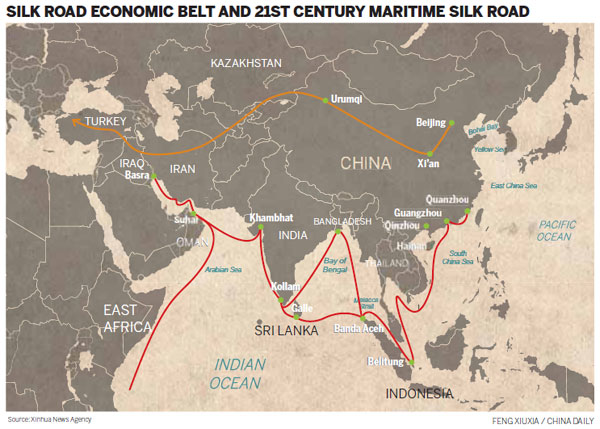 |
The State Administration of Taxation announced on Tuesday that it is drawing up a taxation plan to better support the Belt and Road Initiative, said Wang Jun, director of the administration.
The government will provide better taxation management and services to an increasing number of Chinese companies that have established their brands outside the country, Wang said at a taxpayers' conference in Beijing.
Some well-regarded companies in China attended the meeting. Railway manufacturer CSR Corp and Huawei Technologies Co Ltd said the implementation of the Belt and Road Initiative has paved the way for Chinese enterprises to invest overseas, however they increasingly faced difficulties in taxation.
"The overseas tax environment is relatively complex. In some countries, law enforcement is not standardized," said Li Dafeng, vice-president of the finance sector at Huawei.
Wang said the related taxation departments are working to improve the taxation system to serve Belt and Road Initiative related projects.
"In addition, tax reform is shifting toward green taxation. We plan to strengthen the taxation support to environmental protection sectors. We have already reported the environmental protection tax plan to the State Council, whereas taxation itself won't solve all the problems. Coordination with other departments remains necessary," Wang said.
Related story: China's Belt, Road initiatives not geo-strategic tool: official, by Xinhua
China's Belt and Road initiatives will facilitate economic cooperation and will not act as a geo-strategic tool, a senior foreign affairs official said Saturday.
The initiatives do not target particular countries or international organizations, said Vice Foreign Minister Zhang Yesui at the China Development Forum in Beijing.
The Silk Road Economic Belt and the 21st Century Maritime Silk Road, proposed by China in 2013, follow the principles of joint consultation, construction and sharing. It will be an open and inclusive platform for regional cooperation, taking into full consideration the position, interests and convenience of every side, Zhang said.
China and the United States share much common interests and space for cooperation in the Asia Pacific, which should become a region of priority to build a new model of major-power relations between the two countries, he said.
He also noted that the planned Asian Infrastructure Investment Bank (AIIB), which would finance infrastructure construction along the belt and road, conform to the needs of the region and complement existing financial institutions.
China is a participant, builder and contributor to the current international order and system, Zhang said.
The country has always safeguarded post-war international order with the United Nations at its core. China also advocates reform in accordance with the development of situations, promoting democratic international relations and law-based global governance, he said.
